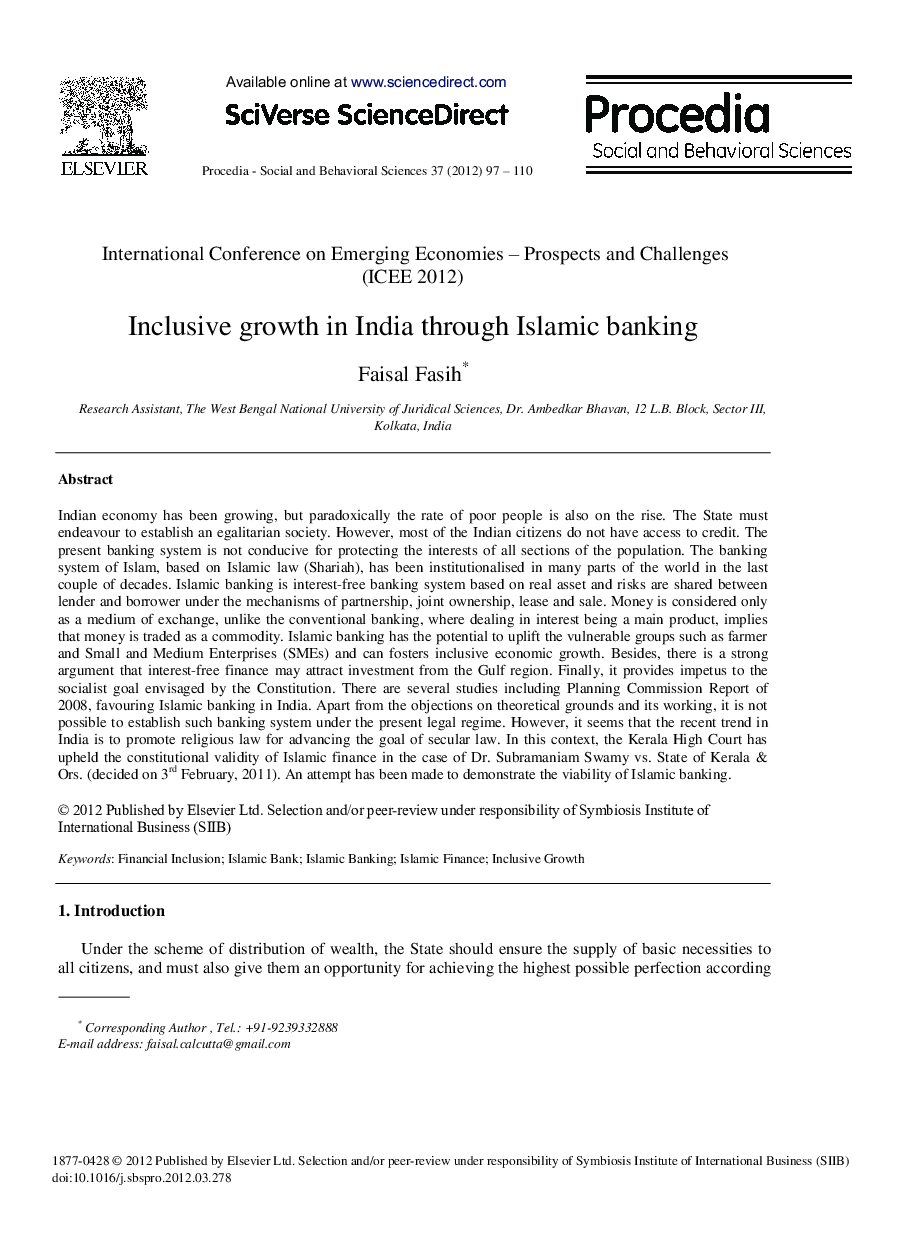| کد مقاله | کد نشریه | سال انتشار | مقاله انگلیسی | نسخه تمام متن |
|---|---|---|---|---|
| 1122716 | 1488522 | 2012 | 14 صفحه PDF | دانلود رایگان |
عنوان انگلیسی مقاله ISI
Inclusive growth in India through Islamic banking
ترجمه فارسی عنوان
رشد فراگیر در هند ازطریق بانکداری اسلامی
همین الان دانلود کنید
دانلود مقاله ISI انگلیسی
رایگان برای ایرانیان
کلمات کلیدی
-
شمول مالی - بانک اسلامی - بانکداری اسلامی - امور مالی اسلامی - رشد فراگیر -
مقاله درباره اسلام
فهرست مطالب مقاله
چکیده
مقدمه
روش کار بانکداری اسلامی
شراکت
فروش
کرایه
مالکیت مشترک
دلایل استفاده از بانکداری اسلامی در هند
رشد فراگیر
شمول مالی مسلمانان
توسعه ی شرکت های کوچک و متوسط
ارتقاء زندگی کشاورزان
سرمایه گذاری خلیج فارس
تحلیل بازار و برنامه ریزی استراتژیک
نتیجه گیری
ترجمه چکیده
با وجود اینکه اقتصاد هند رو به رشد است، اما تعداد مردم فقیر نیز رو به افزایش است. دولت باید برای ایجاد یک جامعه ی مساوات طلب تلاش کند. با این حال، بسیاری از شهروندان هندی به وام دسترسی ندارند. سیستم بانکی کنونی برای حفاظت از منافع همه بخش های جامعه مساعد نیست. سیستم بانکی اسلام بر اساس قانون اسلامی (شریعت) می باشد و در چند دهه ی اخیر در بسیاری از نقاط جهان متداول شده است. سیستم بانکداری اسلامی، بدون بهره و بر اساس دارایی است و خطرات احتمالی را، بین وام دهنده و وام گیرنده تحت مکانیسم های مشارکت، مالکیت مشترک، اجاره و فروش، تقسیم می کند. بر خلاف بانکداری متداول که در آن با در نظر گرفتن بهره، پول به عنوان یک کالا مبادله می شود، در بانکداری اسلامی پول فقط به عنوان وسیله ی مبادله در نظر گرفته می شود. بانکداری اسلامی این قابلیت را دارد که گروه های آسیب پذیری مانند کشاورزان و کمپانی های کوچک و متوسط را بالا برده و باعث رشدِ اقتصادی فراگیر شود. گذشته از این، استدلالی محکم ادعا می کند که ممکن است امور مالی بدون بهره، سرمایه گذاری را از منطقه خلیج فارس جذب کند. در نهایت، بانکداری اسلامی انگیزه ی دستیابی به هدف سوسیالیستیِ پیش بینی شده در قانون اساسی را ایجاد می کند. مطالعات بسیاری از جمله گزارش کمیسیونِ برنامه ریزی در سال 2008، بانکداری اسلامی در هند را، تأیید می کنند
موضوعات مرتبط
علوم انسانی و اجتماعی
علوم انسانی و هنر
هنر و علوم انسانی (عمومی)
چکیده انگلیسی
Indian economy has been growing, but paradoxically the rate of poor people is also on the rise. The State must endeavour to establish an egalitarian society. However, most of the Indian citizens do not have access to credit. The present banking system is not conducive for protecting the interests of all sections of the population. The banking system of Islam, based on Islamic law (Shariah), has been institutionalised in many parts of the world in the last couple of decades. Islamic banking is interest-free banking system based on real asset and risks are shared between lender and borrower under the mechanisms of partnership, joint ownership, lease and sale. Money is considered only as a medium of exchange, unlike the conventional banking, where dealing in interest being a main product, implies that money is traded as a commodity. Islamic banking has the potential to uplift the vulnerable groups such as farmer and Small and Medium Enterprises (SMEs) and can fosters inclusive economic growth. Besides, there is a strong argument that interest-free finance may attract investment from the Gulf region. Finally, it provides impetus to the socialist goal envisaged by the Constitution. There are several studies including Planning Commission Report of 2008, favouring Islamic banking in India. Apart from the objections on theoretical grounds and its working, it is not possible to establish such banking system under the present legal regime. However, it seems that the recent trend in India is to promote religious law for advancing the goal of secular law. In this context, the Kerala High Court has upheld the constitutional validity of Islamic finance in the case of Dr. Subramaniam Swamy vs. State of Kerala & Ors. (decided on 3rd February, 2011). An attempt has been made to demonstrate the viability of Islamic banking.
ناشر
Database: Elsevier - ScienceDirect (ساینس دایرکت)
Journal: Procedia - Social and Behavioral Sciences - Volume 37, 2012, Pages 97–110
Journal: Procedia - Social and Behavioral Sciences - Volume 37, 2012, Pages 97–110
